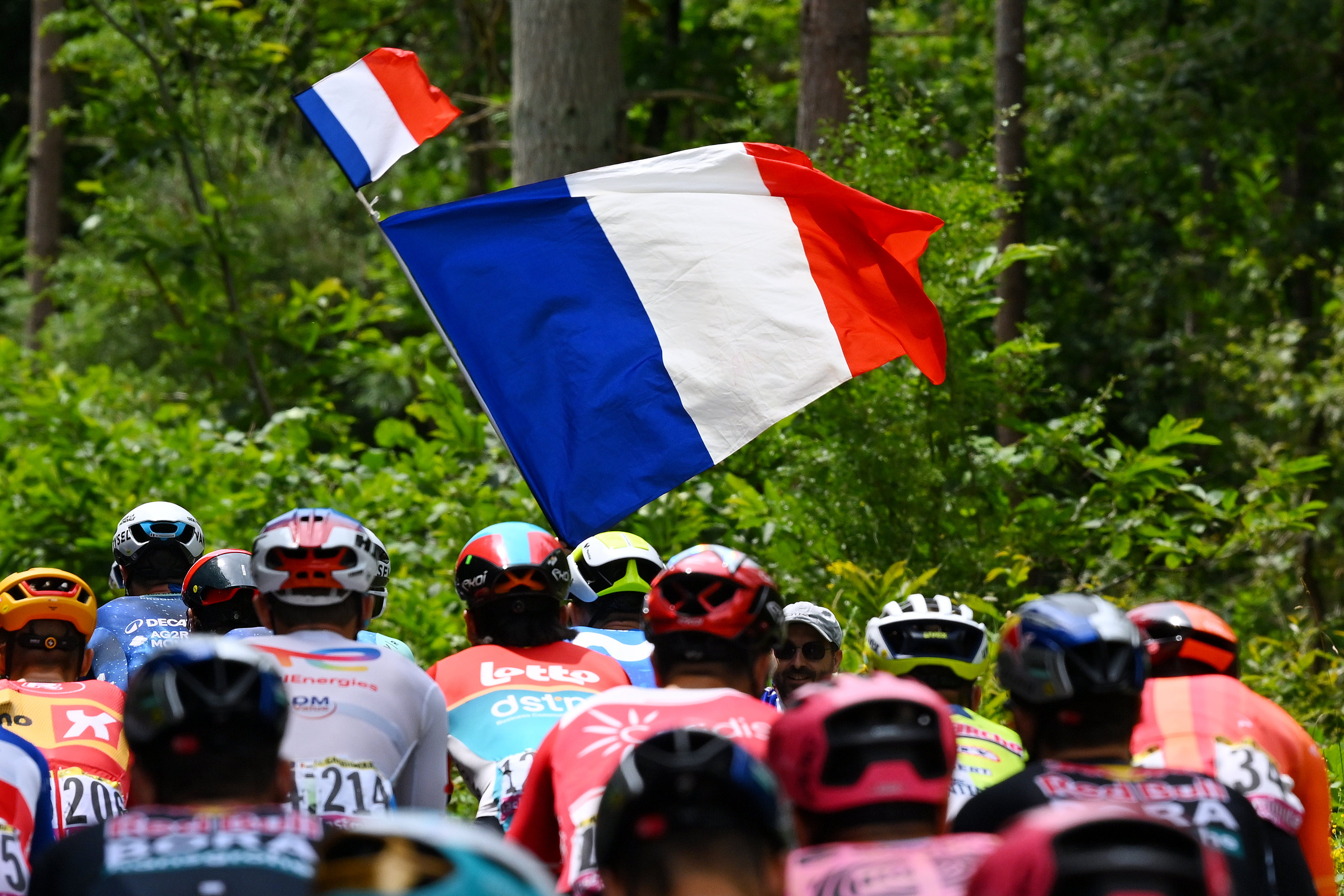
As one of cycling’s key heartlands, France has played host to the sport’s marquee event for over 120 years, and the Tour de France continues to monopolise the attention of everyone involved with professional cycling, from riders and team management to the media and the fans.
Beyond La Grande Boucle, however, in the nation that brought us legends of the sport from Jacques Anquetil to Bernard Hinault, there are a host of races beyond the Tour that take place on French soil each season, contributing to a thriving national cycling scene that continues to produce a strong pedigree of talent.
While dreams of Le Tour undoubtedly drive the ambitions of young riders in France, the continued robustness of the French cycling scene could also be attributed to this broad base of less prestigious events, which allow riders who aren’t in the uppermost echelons of the peloton the space to race, refine their condition, fight for points for their teams and compete for national pride.
The centrepiece of this subset of French races is the men's Coupe de France, the series that unites races like Tro Bro Léon, GP de Denain and the Grand Prix Marseillaise into a year-long competition, with an overall winner at the end.
While it may exist in the shadow of the Tour, both in terms of its reach and its prestige, the Coupe de France is without doubt the most coherent – and in fact one of the only remaining – national cup series still in existence on the European continent. With the parcours as diverse as the locations they take place in, the Coupe de France is a shifting conglomeration of one-day races taking place from the northernmost tip of France to the Riviera, from the western tip of Brittany to the eastern border with Switzerland.
Its inception in 1992 means the Coupe de France has a history that dates back just 33 years, but many of the races it brings together are historically significant, part of a rich tapestry of events that characterise French cycling culture. In 2025, the Coupe features 17 races – courses which represent the best of France, from hidden gems to iconic climbs and circuits, each with its own unique local flavour and character. These races are corralled into one national competition which spans the season by organiser the Ligue Nationale de Cyclisme (LNC).
Though the series is regularly over-shadowed by other races in the cycling media, the significance of the Coupe de France warrants deeper exploration, both in terms of what it means to the riders and teams involved, and in and of itself, as a bastion of everything that makes cycling brilliant – instinctive, aggressive, and tactical racing; truly unpredictable outcomes, and a broad selection of riders interested in success, from young upstarts to seasoned veterans and everything in between.
Despite its omission from the headlines and its lower status in terms of UCI classification, the series’ robust broadcast rights ensure that a portion of every race is available to view both on terrestrial channels in France and across the globe. Taking the time to invest in the multi-faceted series, replete with local idiosyncrasies and racing that trickles up to the WorldTour, is worth the time of the enthusiastic cycling fan.
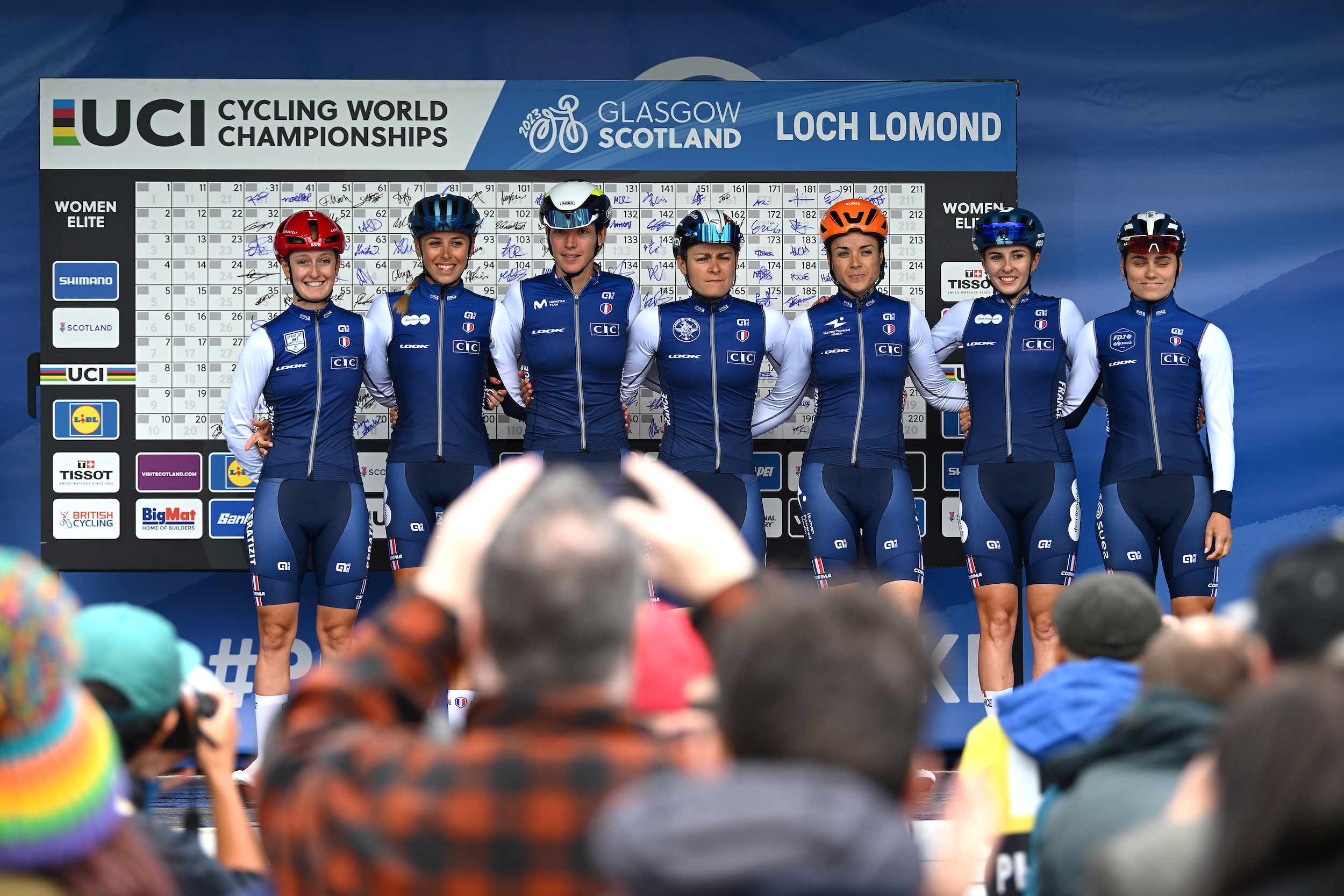
While the Coupe de France races have been assimilated into the men’s calendar, the women’s equivalent is still emerging, competing with a range of other races that are added to the schedule year on year as the women’s side of the sport goes through a rapid growth phase.
Established just three seasons ago in 2022, the French Cycling Federation (FFC) introduced a women's version of the competition in association with FDJ, with the aim of promoting women's cycling in France, and though it is in a nascent phase, it represents a significant opportunity for the evolution of women’s cycling in France, just as it does for the men.
Featuring nine races in 2025, the competition also includes individual and team classifications, and includes some of the same courses as the men's circuit, along with some unique to the women's peloton.
"The races that compose the Coupe de France are long-established fixtures in the French cycling calendar, and part of the women's cycling heritage in France," explained FDJ-SUEZ team manager Stephen Delcourt, whose team have been performing well at the series so far this season, currently placing second in the team competition, with rising stars like Léa Curinier and Célia Gery producing strong performances.
A team with big ambition, FDJ-SUEZ may have signed the world’s leading rider in Demi Vollering for 2025, but they have not lost sight of their national roots, as Delcourt explains.
"The Coupe de France Elites Femmes FDJ has a special significance for our team, that allows us to confirm our position as one of the leading women's cycling teams in France, and as a 'home' of rising talents. The races provide an opportunity for our riders to demonstrate their strengths and win a spot for the biggest races of the season."
The home advantage
Often taking place concurrently with more high-profile WorldTour events, the races that make up the men's Coupe de France have a field of relatively well-matched riders, with French WorldTour teams the top-billed participants, and they provide a refreshing contrast to the increasing homogeneity and domination that is coming to define men’s cycling; wide open, aggressive and with a range of winners. Many have women’s races, some also have junior and age group categories, and in the local areas in which they take place, the celebratory atmosphere is representative of the importance of cycling to the French. ‘
"They're rooted in the region, and the people are pretty proud of it," observes cycling commentator José Been, who is a regular fixture on the Eurosport feeds of the race broadcasts. "They're always fondly supported by the departments, the local mayor and local dignitaries."
Every race in the series has its quirks, from the live pig awarded to the first Breton over the line in the Tro Bro Léon, to the wheel of cheese awarded to the lucky winner of the Tour de Jura. With local traditions, loyal fans and local riders from French teams hoping to make an impact in their hometowns, it’s easy to imbue the Coupe de France with a romantic significance as the authentic home of French cycling and assume it holds a special place in the hearts of those riding it. Is this assumption a fallacy, viewed through blue, white and red-tinted lunettes? Is there any truth to the idealistic notion that the Coupe de France races signify anything meaningful to French riders or teams? Or are they just dates on a calendar – just another set of races in the eternal carousel of places to be that aren’t home?
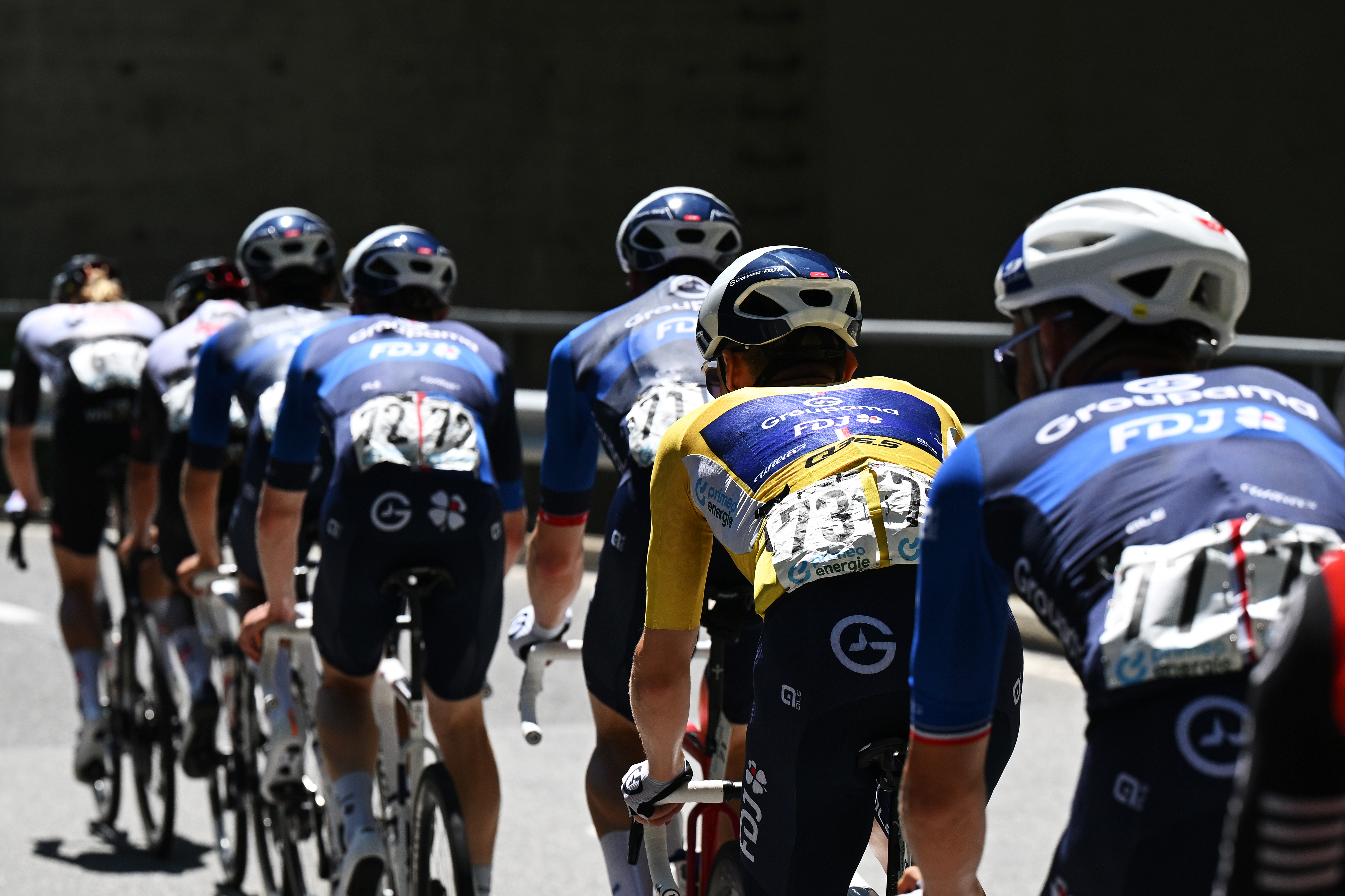
Groupama-FDJ balance both Coupe de France races and WorldTour events in their programme
Marc Madiot, manager of one of France’s biggest teams, Groupama-FDJ, is quick to disavow me of my romantic notions of patriotic meaning.
"National pride comes when you win, whether it's in France or abroad," says Madiot. "There's no special national pride linked to the Coupe de France. We just try to win whenever we have the opportunity. Winning is so hard that every chance has to be taken."
It's a sentiment echoed by Decathlon AG2R La Mondiale’s Cyril Dessel, who notes that as a French WorldTour team, they hold a position of power in these races.
"We approach these races with ambition, to win and to build momentum," says Dessel. "The Coupe de France is key for building confidence. The level is a bit lower, and it allows our riders to gain momentum and prepare for bigger targets throughout the season."
He offers the example of reigning national champion Paul Lapeira, who used spring French Cup races as a springboard to victory in a stage of Itzulia Basque Country in 2024, prior to raising his arms in his national road race. Madiot too, despite brushing off the sentimental notions, agrees that these races have rescued seasons in the past – he recalls Phillippe Gilbert, Arnaud Démare, and most recently Paul Penhoët, the overall winner of the series in 2023, as examples where Coupe de France victories have propelled them to bigger and better things.
Taking a driving seat in the way a race unfolds is not the reality for teams like Groupama and Decathlon in most WorldTour level races. On home turf, however, they are afforded the opportunity for a little role reversal.
"Our mindset going into these races is to be aggressive and create opportunities to win," says Dessel. "We’re often among the favourites, and it’s a role we have to embrace. That allows us to take the initiative and control the race, something that’s harder to do in WorldTour events where teams like UAE or Visma dominate. These races give us the chance to take control, race to win, and build confidence."
Madiot is in agreement, describing "tense and punchy" races as "good for our riders" by contrast with "the kind of steamroller races you find in the WorldTour".
Despite none of the races being WorldTour level, the prestige and appeal of the many varying legs of this lesser tour of France is clear. From cobbled northern classics to gravel farm tracks to winding uphill finishes, opportunities abound for sprinters, puncheurs and baroudeurs, and competition is always fierce, with French ProTeams and Continental outfits prioritising the races as key opportunities to compete on home soil. Simultaneously, WorldTour teams take the opportunity to farm much-needed UCI points, to blood new recruits, neo-pros and development riders, or to rehabilitate top names as they return from injury, before they are thrust once more onto the biggest stage.
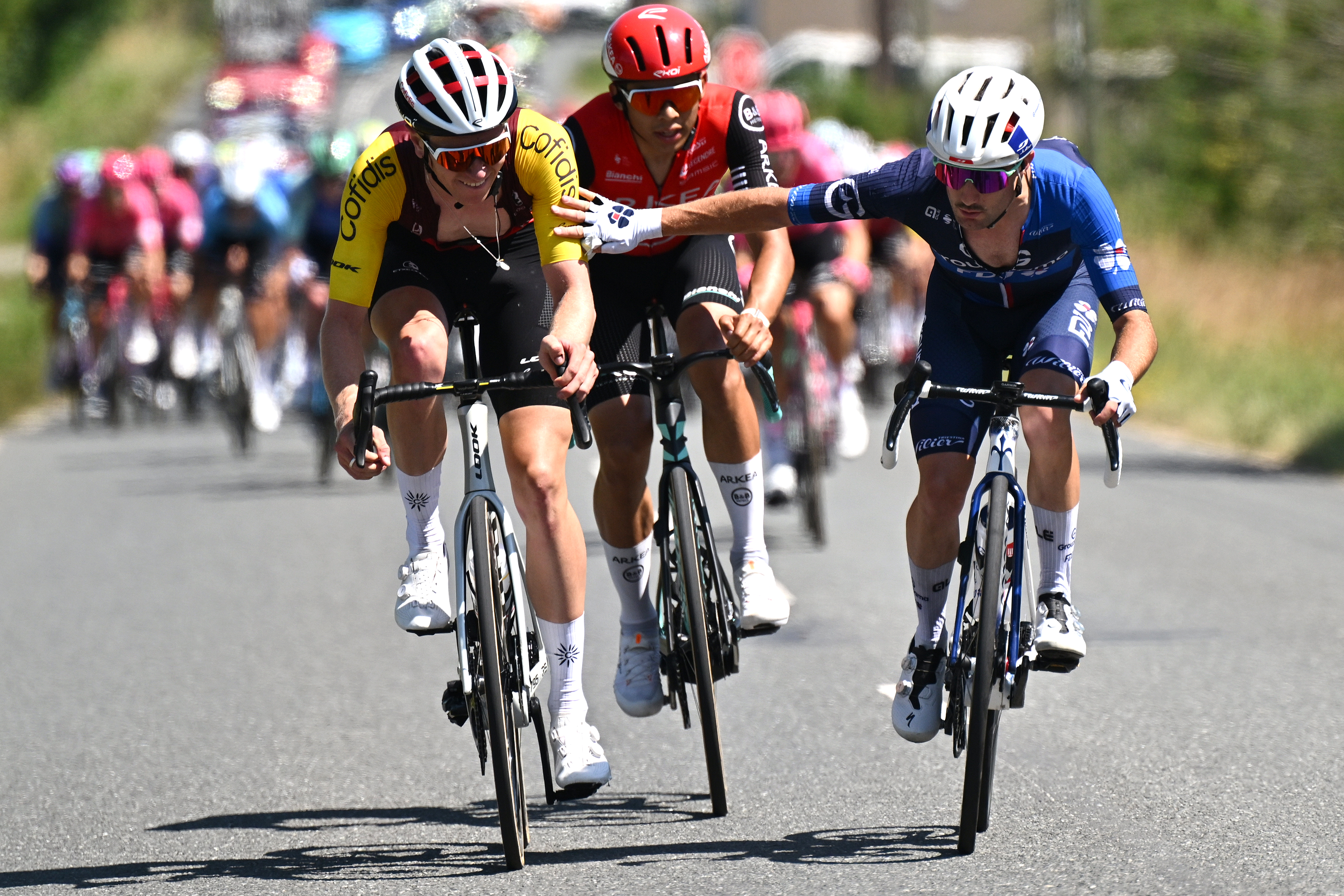
The French teams are battling for more than just the races themselves – they're battling for survival.
WorldTour teams are required to divide their resources carefully, tailoring their picks for each race so that other goals aren’t compromised, but also with the hope that they can enjoy the benefits that accompany being a big fish in a smaller pond. Within the WorldTour, French teams occupy the mid-low end of the table, when it comes to, well, everything – from budget to UCI points – with Groupama and Decathlon faring best, currently ranked eighth and 10th in the standings as of June 17, while the other two – Cofidis and Arkéa-B&B Hotels – both regularly find themselves struggling for survival in an extremely competitive pool up against the ever-present relegation battle. With things like WorldTour licences and Grand Tour starts up for grabs, the need to score points is high.
These added factors make for the kind of racing that isn’t seen at the higher status events, and a wider field of riders and teams are seeing the Coupe de France as a place to score points. So far in 2025, only just over 50% of the races have been won by Frenchmen, in contrast to the previous year, when just four winners throughout the series were non-French riders, from non-French teams.
Subplots and momentum
The series defies attempts to impose an overarching narrative onto it – beyond the arbitrary reality of the overall winner, and the team competition which only French teams are eligible to win and which garners about as much interest as almost any team competition: i.e. none. Despite this, there are a pair of mini-racing blocks set two weeks apart, each with a different set of characteristics, tying them together to form two mini-stage races of sorts. They provide a kind of crescendo as the Coupe heads towards a natural pause to make way for its big sister, Le Tour, and this year, represented a focal point for the top French WorldTour teams as they built towards the biggest race on the calendar.
First, the triple header in the eastern Franche-Comté region of the Classic Besançon de Doubs, Tour de Doubs, and Tour de Jura, which favours the climbers and is a minority in the series which this year features eight races that usually conclude in bunch sprints, with most of the rest being punchy affairs. As a result, the composition of the start list shifted from gritty classics men to riders of a more sinuous physical profile, the upper echelons of whom were preparing for the bigger goals of the season, including the Grand Tours. Just as they did in 2024, when David Gaudu and Lenny Martinez divided the spoils from the trio of races between them, Groupama-FDJ dominated this block once again, underscoring their profile as a team more built around GC ambitions. New recruit Guillaume Martin won the first two races of the weekend, though the team missed out on the final victory following a late move from a quartet of riders, with TotalEnergies' Mattéo Vercher proving the strongest.
The second narrative arc centred around the cycling-mad community in Brittany, moving onto rolling terrain that characterises the region. The Brittany block features four contrasting races in four consecutive days, opening with the Boucles de l’Aulne – the oldest race on the Coupe de France circuit, with its first edition dating back to 1935, and one which numbers the cream of cycling royalty amongst its winners, both French and beyond: the likes of Anquetil, Hinault, and Eddy Merckx.
Featuring 14 hectic laps of a finishing circuit, with short, punchy climbs and an uphill slog to the finish line, like all the French Coupe races, it was raced hard a long way from that finish line. An elite group of favourites moved clear with more than 70 kilometres remaining, and from there it was flowing, shifting, and constantly aggressive. The race saw further success for Groupama-FDJ – a team struggling on the WorldTour level, with no top-level wins at that point – as the Brit Lewis Askey scored his first pro victory.
After that, the focus shifted to the beautiful eastern coast of Finistère. Meaning ‘the tour of the end of the world,’ the Tour du Finistère would represent a beginning for Decathlon AG2R La Mondiale as momentum shifted their way after a less-than-auspicious start to the year. It was a race that sparked hope, not just for the team but for the future of French cycling, as neo-pro Aubin Sparfel took his maiden elite victory, aged just 18.
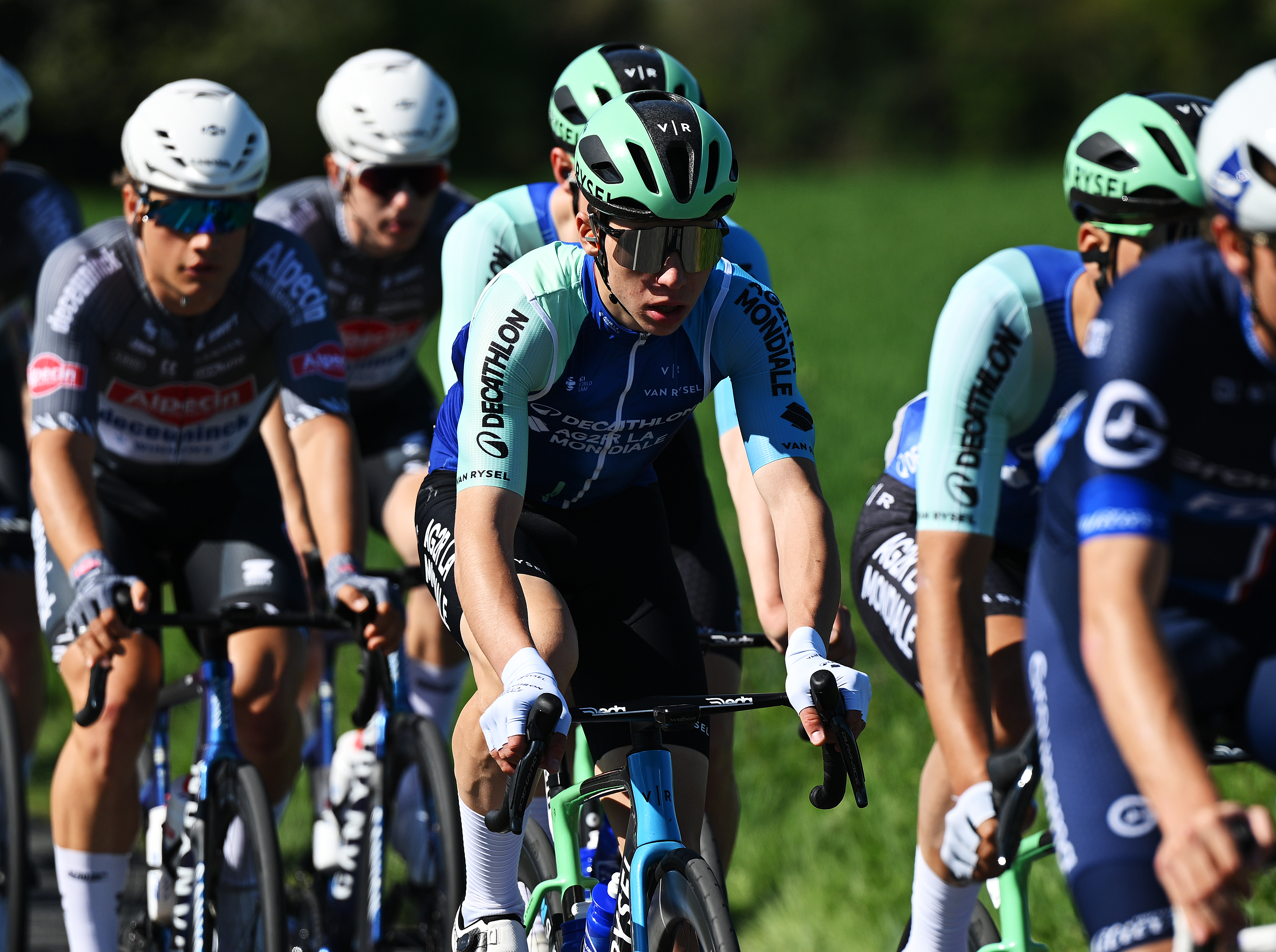
Coupe de France races give riders like Sparfel a chance to win, which they might not get so soon on the WorldTour
"Aubin’s win was full of boldness and smart racing," Dessel remarks. "He managed to stay with the best riders in the finale. He showed a lot of maturity."
The following day, the momentum continued for the team, with a third career victory at the GP du Morbihan for Benoît Cosnefroy, who returned to racing after eight months sidelined.
Finally, perhaps the most iconic of all the Coupe de France races: Tro Bro Léon. A tricky affair on a good day, with the peloton tackling a series of rough gravel farm tracks known as ‘ribinoù’, wet conditions blighted the 2025 edition with crashes and mechanicals hampering the progress of many, while the host broadcaster struggled to maintain live images. Fighting back from a series of mishaps, Bastien Tronchon took one of the most impressive victories of the season so far, in what Dessel describes as "the most unpredictable race of the weekend, under very difficult conditions. He was the strongest that day. Despite two punctures and a crash, he dug deep to return to the front and take the win."
For Decathlon, the Bretagne races represented a swing in momentum. In each case, a promise – of the future of French cycling; of the return to form of their most talismanic leader; and of the determination and talent of the young riders rising through the ranks. And to Groupama-FDJ’s Valentin Madouas, the best-placed Breton rider, making the podium in third on his debut, went the spoils – a locally reared pig, also named Léon, who has since been pictured living his best life at the former national champion’s home in Brest. Only in France.
Racing open to the underdogs
Away from the WorldTour ‘steamroller’ Madiot describes, the atmosphere at Coupe races seems to suggest that anything is possible – allowing young riders the space to try things they may lack the confidence for at bigger races.
Riding for ProTeam Wagner Bazin WB, with whom he turned pro in 2024, 23-year-old Brit Tom Portsmouth could be spotted in a breakaway for the first time at the Tour de Doubs, allowing him to test himself against a strong field.
"I've waited such a long time to have that ability to just race and see what happens,’ Portsmouth reflects. He went on to note that the race was ‘probably one of the most pure races that I've done as a pro. "Super open racing, which really invited rolling attacks. [I needed to] be really switched on, I didn't want to wait and sit back."
It ran contrary to his expectation, following years of honing his craft mainly in Belgium.
"I was surprised," says Portsmouth. "It was less locked down, really good-quality riders willing to lay it on the line and just send it and see what happens."
Portsmouth’s considered reaction reflects the spirit of competitive freedom at the Coupe de France, where the battles are fierce, yet somehow inclusive, offering the underdog a tempting opportunity.
"WorldTour racing has become quite formulaic in a way, because that’s where it counts the most," José Been observes. "Who has got the highest budget and who has not. In these smaller races, budget is less of a factor. Normally it's quite predictable who's going to win a race. And in French cup racing, that's not the case."
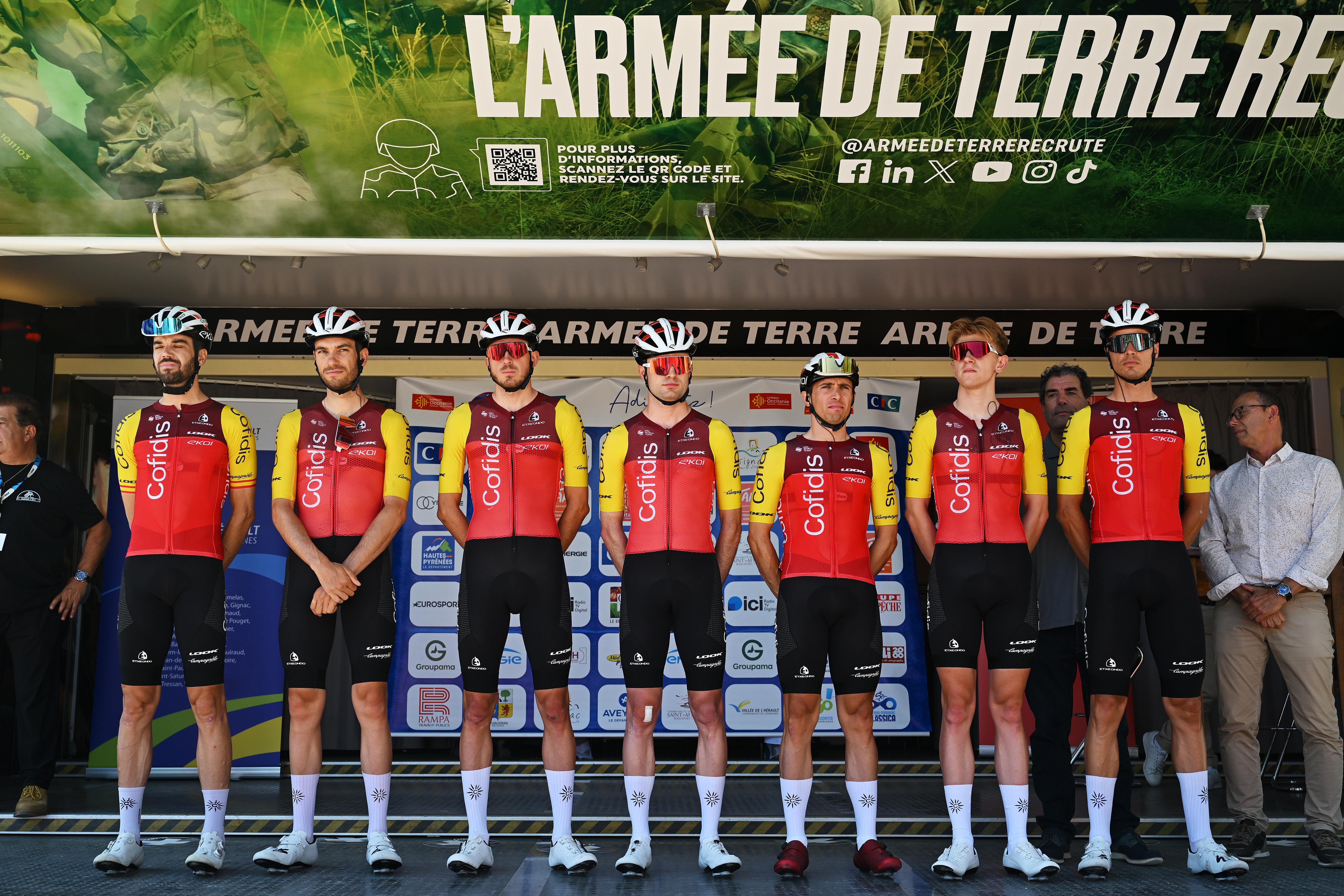
At French cup races, teams like Cofidis are bigger fish in a smaller pond
With a newly minted French racing license, the Unibet Tietema Rockets are another underdog team using the events to enhance their visibility in France, with the ultimate goal of being selected for the Tour.
"I think that's the best possible way of making the first steps on the French cycling landscape," team founder Bas Tietema explains. "It's a thing that we take seriously this year, really prioritising it in the race calendar."
This approach has paid dividends already, with a rider new to the team’s roster, Lukáš Kubiš, following up on a promising Classics season with his first pro victory, at the Cholet Agglo Tour in March.
"Because of that momentum, the spirit in the team and also the course, we really believe that the win was possible," Tietema says. He outlines the importance of finishing 2025 as one of the top 30 teams, to give them a chance of being selected for wildcards going forward. "At this moment, we are the best of the rest. I would say."
In the long run, however, it could be the races themselves which are the underdogs, battling against the might of their own compatriots ASO when it comes to wealth and status, struggling for survival while the Tour de France continues to suck the metaphorical oxygen out of the sport.
"They don't have the big organisations behind them," says José Been. "They do it from passion and the costs in organising them are increasing exponentially every year."
A fertile breeding ground
A pessimistic outlook extends beyond the races themselves. Former French national team selector Cyrille Guimard bemoaned the state of the nation’s cycling hopes in a recent interview, stating that French cycling "is in clear decline", and pointing out that while French riders are producing good results at the Coupe de France they are failing to achieve at the highest level of the sport.
While Guimard places the blame on budgetary constraints, his point actually reinforces the importance of these races to the continued development and success of French riders and teams. While they may not be able to gain a foothold on the biggest stages, there are still opportunities for them to shine at home. Not only is this key to confidence and development but also when it comes to seeking out talented riders who may otherwise slip through the net – and moreover, riders who will be affordable.
José Been agrees: "When you have teams who don't have 60 million a year, these races are the kind of hunting grounds where you find little gems on the market."
One such example is Clement Braz Afonso, who was picked up by Groupama-FDJ from CIC Nantes Atlantique at the age of 24, having been scouted at the Coupe de France. Braz Afonso is now a core member of the team, instrumental in bringing about victory for Guillaume Martin at two races this year, paying back the team’s belief in him.
A rider who perhaps wasn’t ready to step up to the WorldTour at 18 like some of cycling’s prodigies, Braz Afonso provides an example of the significance of these smaller races to riders following a more traditional pathway. Despite Guimard’s comments, it’s just such a robust breeding ground that is required to advance the sport organically in France and ensure that there is the opportunity for the best riders to shine.
In an era of tightly controlled racing and often predictable outcomes, the true essence of what many fans love about men’s pro cycling is still flourishing in France. Though the nation may not have had a Tour winner since Hinault’s fifth and final success in 1985, and are still awaiting their next great GC hope, following the retirement of Thibaut Pinot and Romain Bardet, the French retain their joie de vivre in the Coupe de France. The races invite all-comers to try their luck, without the constraints of the richest teams pulling the strings in favour of the elite few at the top of the sport.







